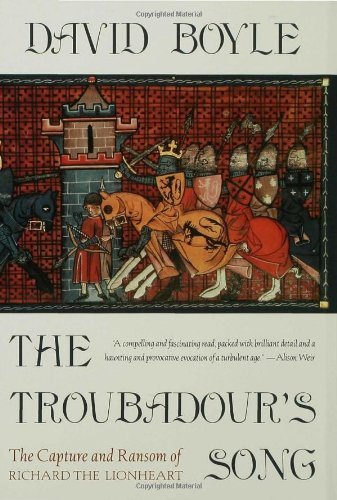
On his long journey home from the Third Crusade, Richard the Lionheart—one of history's most powerful and romantic figures—was ship-wrecked near Venice in the Adriatic Sea. Forced to make his way home by land through enemy countries, he traveled in disguise, but was eventually captured by Duke Leopold V of Austria, who in turn conveyed him to Henry VI, the Holy Roman Emperor. Henry demanded a majestic ransom, and Richard's mother, Eleanor of Aquitaine, raised the historic sum—one quarter of the entire wealth of England—and Richard was returned. But a peculiar legend followed him—that a troubadour named Blondel, a friend of Richard's, had journeyed across Europe singing a song he knew Richard would recognize in order to discover his secret place of imprisonment. David Boyle recreates the drama of the Third Crusade and the dynamic power politics and personalities of the late 12th century in Europe, as well as the growing fascination with romance and chivalry embodied in the troubadour culture. An evocation of a pivotal era, The Troubadour's Song is narrative history at its finest.
Author
David Boyle is the author of Blondel’s Song: The Capture, Imprisonment and Ransom of Richard the Lionheart, and a series of books about history, social change and the future. His book Authenticity: Brands, Fakes, Spin and the Lust for Real Life helped put the search for authenticity on the agenda as a social phenomenon. The Tyranny of Numbers and The Sum of Our Discontent predicted the backlash against the government’s target culture. Funny Money launched the time banks movement in the UK. David is an associate of the new economics foundation, the pioneering think-tank in London, and has been at the heart of the effort to introduce time banks to Britain as a critical element of public service reform - since when the movement has grown to more than 100 projects in the UK. He is also the founder of the London Time Bank network and co-founder of Time Banks UK. He writes about the future of volunteering, cities and business. His work on the future of money has also been covered in books and pamphlets like Why London Needs its own Currency (nef, 2000), Virtual Currencies (Financial Times, 2000), The Money Changers: Currency reform from Aristotle to e-cash (Earthscan, 2002) and The Little Money Book (Alastair Sawday, 2003). He has written for many national newspapers and magazines, and edited a range of magazines including Town & Country Planning and Liberal Democrat News. He is the editor of Radical Economics. He lives in Crystal Palace, in south London, with Sarah and Robin (two years old). He is a member of the Federal Policy Committee of the Liberal Democrats and he stood for Parliament in Regents Park and Kensington North in 2001.